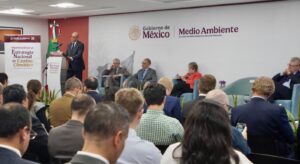 Mexico has unveiled a comprehensive National Climate Strategy, aiming to reduce greenhouse gas emissions by 140 million tonnes by 2030, representing a 35% decrease from current levels. This strategy encompasses renewable energy projects, reforestation initiatives, circular economy practices, and the decarbonization of the electricity sector. Key emission sources identified include transportation, energy, and agriculture. The plan also focuses on restoring 100,000 hectares of forests and 80,000 hectares of mangroves, and converting waste into energy, inspired by practices in countries like Denmark. These efforts align with Mexico’s commitments under the Paris Agreement and are set to be presented at the 2025 Climate Change Conference in Brazil.
Mexico has unveiled a comprehensive National Climate Strategy, aiming to reduce greenhouse gas emissions by 140 million tonnes by 2030, representing a 35% decrease from current levels. This strategy encompasses renewable energy projects, reforestation initiatives, circular economy practices, and the decarbonization of the electricity sector. Key emission sources identified include transportation, energy, and agriculture. The plan also focuses on restoring 100,000 hectares of forests and 80,000 hectares of mangroves, and converting waste into energy, inspired by practices in countries like Denmark. These efforts align with Mexico’s commitments under the Paris Agreement and are set to be presented at the 2025 Climate Change Conference in Brazil.
UN Climate Change Executive Secretary Simon Stiell commended Mexico’s strategy as a “roadmap to prosperity, social development, and economic stability,” emphasizing its potential to transform climate ambition into tangible outcomes that strengthen the economy and improve livelihoods. He highlighted the strategy’s focus on resilience and opportunities, particularly for rural farmers, remote villages, and urban areas, aiming to provide clean energy, reduce health costs, and create well-paid jobs.
The updated Nationally Determined Contribution (NDC) submitted by Mexico in November 2022 includes these targets and outlines plans to increase clean energy production to 40 gigawatts by 2030, which could power approximately 30 million homes annually. The NDC also emphasizes adaptation measures in ecosystems, food systems, human populations, infrastructure, and water resources.
This strategic approach positions Mexico as a leader in Latin America’s transition to a sustainable and inclusive low-carbon economy.
Source: UNFCCC
